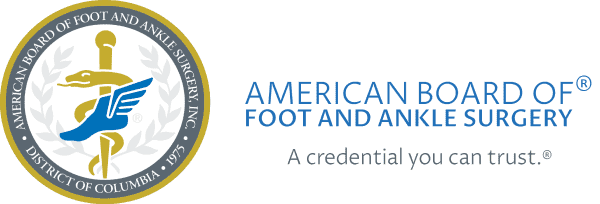FREQUENTLY ASKED QUESTIONS: BOARD CERTIFICATION
- What Exactly is Board Certification?
Board certification is the recognition of individuals who have demonstrated an interest in a field of specialty within their profession, have met specific specialized educational requirements in that field of interest, have shown their specific medical knowledge through written and oral examination, and have demonstrated a practical standard of competency in that area of specialization. It is a rather long and arduous process, and any podiatric physician who has been certified by a particular board has passed the rigid standards of qualification and examination set forth by that particular board of examiners.
- Common Misunderstandings About Board Certification
Many myths exist regarding board certification. One common misunderstanding by the public is that all physicians need to be board certified to legally practice medicine. They don't. Board certification is an extra level of achievement beyond school, residency and licensure.
Another erroneous belief is that board certification is the same as passing the provincial or state licensure board. It's not. The board certification exam process is much more strenuous--and it's an optional one. Only those physicians who wish to demonstrate interest and achievement in a certain field attempt to achieve board certified.
Another common myth is that all boards offering board-certification are the same. They're not. In fact, there may be several boards that offer board certification. But only those boards that are recognized by their professional association are seen as credible by that profession.
The American Podiatric Medical Association (APMA) is the only body designated by the U.S. Department of Education to accredit the nation's podiatric medical schools and has the responsibility to approve residency programs and certifications processes.
- Current Qualifications Include:
Completion of a four-year doctoral training program at a CPME-accredited podiatric medical school.
ABFAS certification in Foot Surgery.
Completion of the residency training required for Reconstructive Rearfoot/Ankle Surgery certification at a program approved by the Council on Podiatric Medical Education (CPME).
Submission of a list of procedures through Podiatry Logging Service for Surgery demonstrating a diversity of surgical experience in reconstructive rearfoot/ankle surgery.
Approval by the ABFAS Credentials Committee of complete reconstructive rearfoot/ankle surgery case documentation of procedures selected by ABFAS from the list of procedures.
Passing Part I and Part II of the Certification in Reconstructive Rearfoot/Ankle Surgery Examination.




